Discover How to Create a Medical App: Essential Process and Best Practices
The impact of COVID-19 on mobile app development has permanently transformed the industry, revealed opportunities, and established new trends. Mobile app usage reached peak levels during the COVID-19 lockdown measures. According to estimates, mobile app usage surged by 40% during the COVID-19 pandemic. Similarly, the pandemic accelerated the adoption and development of healthcare apps, leading to innovative solutions and increased remote accessibility to healthcare services. If you are thinking about how to create a medical app and whether your investments will be worthwhile or not, this article will answer your questions.
Research indicates that over 350,000 health apps are available in the market. In addition, the mobile health industry was valued at $106.74 billion in 2023 and is expected to grow to $293.2 billion in 2030. Medical apps are mobile applications that can track health data, manage chronic conditions, and connect with healthcare professionals. These apps improve patient outcomes, reduce healthcare costs, and boost patient satisfaction.
It is high time to invest in creating a medical app if you are an entrepreneur or an app developer. Read this article to discover the essential steps for how to create a medical app.
See our latest relevant exploration Key Elements of Fitness App Development ![]()
What are the main types of healthcare apps?
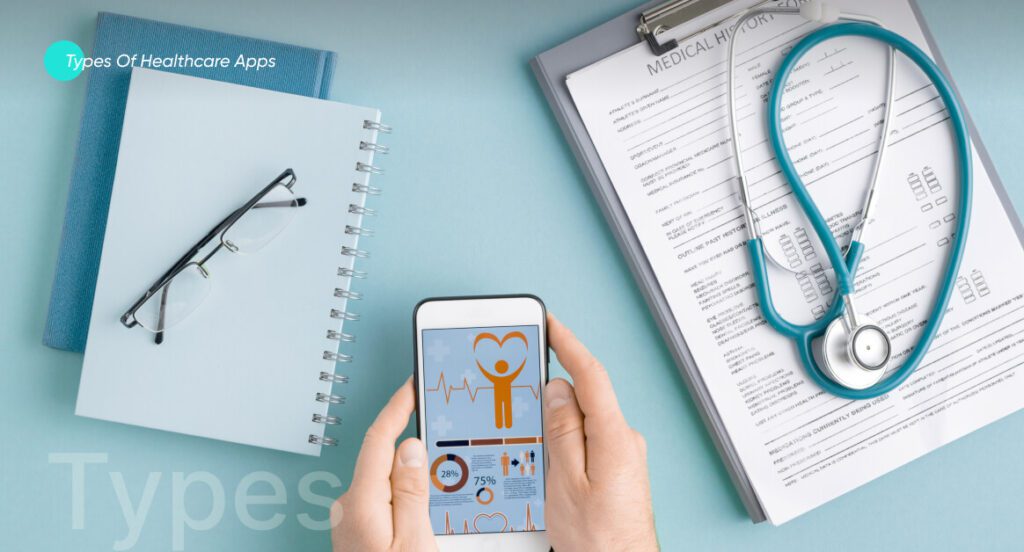
There are four mainstream types of apps in healthcare. Learning more about these apps can help you decide how to create a medical app.
1. Health Counselling Apps
Health counseling apps offer the convenience of connecting with doctors, counselors, and licensed therapists through video calls, chat, or text. In this way, individuals can receive personalized assistance to help individuals improve their health. Leading health counseling apps include Talkspace, Calm, BetterHelp, and 7 Cups.
2. Fitness Apps
Fitness apps aim to support and improve physical activity and help individuals achieve fitness goals. These apps offer personalized coaching sessions, workout tracking, goal setting, and exercise demonstrations. In addition, these apps also guide the form of nutrition and diet plans. Some notable examples of fitness apps include My Fitness Pal, Nike Training Club, Strava, and Home Workout.
3. Lifestyle Apps
A lifestyle tracking app is a mobile application that helps users monitor and analyze their daily activities, habits, and behaviors. These apps often have features such as step counting, calorie tracking, sleep monitoring, and goal setting. They track key metrics like calorie intake, pulse rate, and sleep cycle. In a nutshell, these apps help individuals to recuperate health and well-being. Leading lifestyle tracking apps include Google Fit, My Fitness, and Way of Life.
4. Meditation Apps
Meditation apps assist people in practicing meditation and mindfulness methods. These apps provide many benefits, such as reducing stress, improving mental focus, and enhancing the medical well-being of individuals through meditative exercises, relaxing music, and techniques rooted in nature. Popular meditation apps include Headspace, Calm, Aura, and 10% Happier.
Healthcare app features
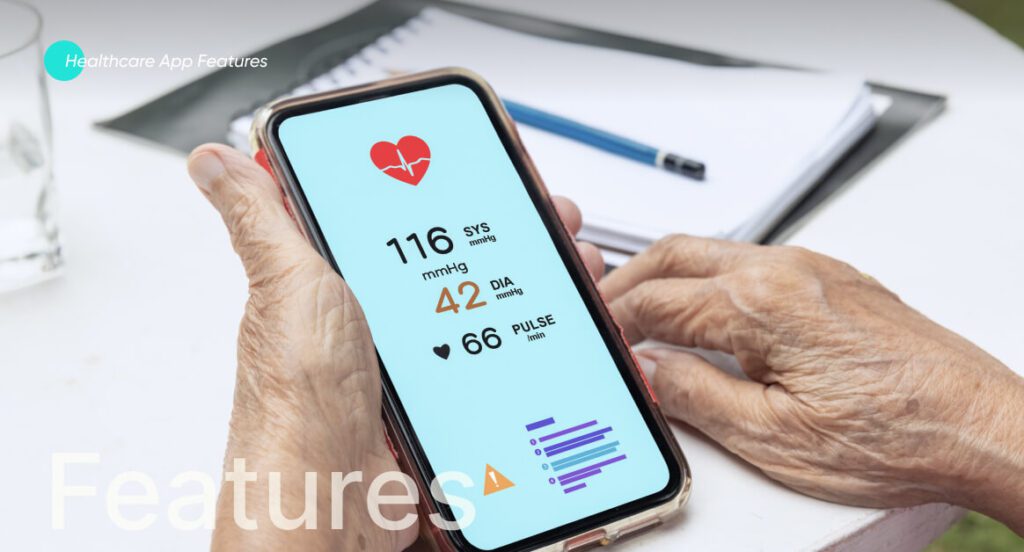
If you want to create a medical app, it is recommended that you integrate the following healthcare app features into your app.
1. Health monitoring and tracking
Medical apps offer features that enable users to monitor and track their health specifications, such as pulse rate, blood pressure, blood glucose levels, sleep patterns, and physical activity. These apps often provide the convenience of integrating wearable devices to collect real-time data and give users insights into their health status.
2. Symptom checker and diagnosis assistance
Some medical apps provide symptom checker tools that allow users to submit their symptoms and receive potential diagnoses or recommendations. Usually, these apps may use artificial intelligence algorithms or medical databases to generate possible diagnoses based on the symptoms reported by the patient.
4. Medicine management
Medication management features help users keep track of their medicines, including dosage, timing, and medication reminders. These apps can also provide information about drug interactions and side effects, allowing users to set up prescription refill reminders.
5. Electronic Health Records (EHR)
Some medical apps allow users to securely store and access electronic health records on their mobile devices. Users can keep their medical history, medications, allergies, and other relevant information, which is later accessible for medical or personal use.
6. Telemedicine and online consultations
With the rise of telemedicine, many medical apps can schedule virtual appointments and consult with healthcare professionals remotely. Users can have video or text-based consultations, seek advice, and receive prescriptions or recommendations for further medical care without needing personal visits.
7. Health education and information
Medical apps often provide learning resources such as articles, videos, and infographics to help users learn about various health conditions, precautionary measures, healthy lifestyle choices, and other medical topics. These resources educate users with the essential knowledge to ensure better health management.
8. Emergency assistance
Some medical apps offer features for emergencies, such as one-touch emergency calling, location sharing, and medical ID information display. These features can be beneficial in situations where immediate medical attention is required.
9. Personalized recommendations
Advanced medical apps also use machine learning algorithms to assess user data and provide personalized recommendations for diet, exercise, medication management, or health improvement plans. They can help individuals attain their goals regarding health or fitness.
Benefits of Health Apps for Doctors and Patients
Healthcare apps offer several benefits for both doctors and patients. To create a medical app, you should explore the advantages for both groups.
Benefits for Doctors:
1. Improved efficiency
Healthcare apps can consolidate administrative tasks like appointment scheduling, patient data management, and billing. This automation reduces paperwork and allows doctors to focus more on patient care.
2. Access to patient data
Medical apps provide doctors instant access to patients’ electronic health records (EHR) and medical history. This access to comprehensive and up-to-date information helps doctors make sound decisions and provide better care.
3. Remote monitoring
Some healthcare apps enable doctors to remotely monitor patients’ health specifications, such as vital signs or chronic condition management. This remote monitoring allows for hands-on intervention and prompt adjustments to treatment plans.
4. Telemedicine and virtual consultations
Healthcare apps facilitate virtual consultations, enabling doctors to remotely connect with patients, offer medical advice, and even diagnose certain conditions. These features enhance access to healthcare, especially for patients in remote areas or with mobility issues.
5. Efficient communication
Medical apps often include secure messaging features that enable doctors to communicate reliably with patients or other healthcare professionals. It enhances collaboration and facilitates quick communication for better coordination of care.
Continuing medical education (CME)
Some medical apps provide access to various educational resources, including medical journals, research papers, and CME courses. These resources offer doctors advanced knowledge regarding healthcare.
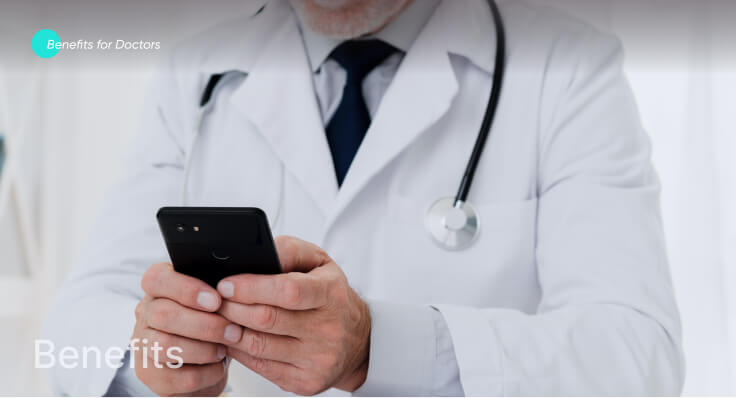
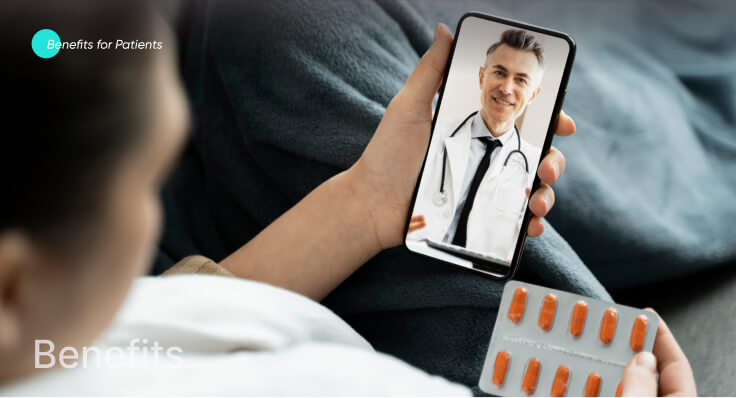
Benefits for Patients:
1. Access to information
Healthcare apps provide patients with easy access to reliable health information, including symptoms, conditions, treatment options, and medication details. It empowers patients to make informed decisions about their health.
2. Appointment management
Patients can use medical apps to schedule appointments, receive appointment reminders, and even check in for appointments digitally. It saves time and boosts the overall patient experience.
3. Personal health tracking
Healthcare apps allow patients to monitor and track their health specifications, such as blood pressure, heart rate, physical activity, and sleep patterns. This self-monitoring helps patients actively manage their health and can help early detection of potential issues.
4. Medication reminders
Medical apps often offer medication management features, including reminders for medication intake, tracking of dosage schedules, and refill reminders. These features help patients stick to their medication regimens and avoid missed doses.
5. Remote consultations
Patients can benefit from virtual consultations offered through healthcare apps, as it eliminates the need for physical visits, reduces travel time, and provides access to healthcare professionals from the comfort of their homes. It supports individuals with limited mobility, chronic conditions, or remote areas.
Healthcare App Development
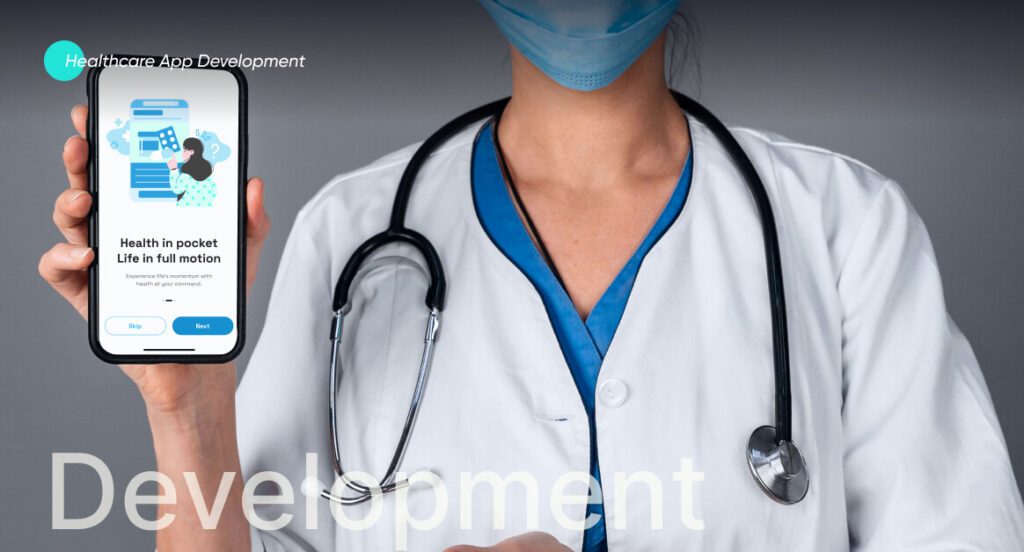
Creating a medical app requires a multifold process, there it is essential for you to have a thorough knowledge of each stage.
1. Research market
Your first step should involve thorough market research for healthcare app development. It will help you understand market competition and analyze the strengths and weaknesses of your competitors. In addition, the market analysis will assist you in defining your niche and clearly understand your target audience. A key element here is to conduct user research and acquaint yourself with people’s sensitive health and medical issues. Determining your target customer’s pain points is essential to making a health app that fully addresses their problems.
2. Create Design
After completing the first stage, you can embark on the most crucial step of creating the design. Your design process should utilize user-centered principles to create intuitive and engaging architecture and interfaces, prioritizing usability and accessibility. Similarly, engage in prototyping repeatedly and gather user feedback to refine the design and enhance functionality. Your medical app should be user-friendly, intuitive, and responsive.
3. Testing
In this stage, the Quality Assurance team performs detailed checks to ensure seamless app performance. At first, these checks involve functional testing for features and functionalities that are working smoothly. Secondly, conduct performance testing to analyze the app’s stability and responsiveness. Finally, perform security testing to identify issues that could thwart the security and integrity of patient data.
4. Regulatory Compliance & Security
Ensure that the medical app development complies with relevant medical regulations, such as HIPAA or GDPR, depending on the target market. Implementing stringent data security measures to protect user privacy and patients’ sensitive medical information would be best.
Challenges for healthcare app development
Although there are numerous benefits to creating a medical app. Nevertheless, there are also some challenges associated with medical app development, they include:
1. HIPAA compliance
To ensure compliance with the US Health Insurance Portability and Accountability Act (HIPAA) requirements, you must implement strict security frameworks, such as encryption and access controls, to protect user data. Ensuring compliance with several HIPAA regulations and requirements drawn by the HIPAA is a highly challenging task as it has rigorous protection for patients’ health data.
2. Scalability
Another challenge for medical apps is ensuring scalability when the customer base expands and data generation and traffic increase. The app must possess the necessary processing power, storage capabilities, and robust architecture to offer optimal performance and responsiveness without damaging scalability and functionality.
3. User Experience
User experience is also crucial for the success of a medical app. Instead of merely focusing on functionality, a healthcare app design must feature user-friendly, intuitive, and navigable interfaces. By implementing these features in your app, you can avoid the challenges of a poor user experience and make your app highly intuitive and responsive.
4. IoT integration
Integrating IoT (Internet of Things) devices with a medical app can pose challenges. These challenges entail ensuring compatibility and seamless integration between IoT devices and a medical app. IoT devices must also provide correct and reliable data to ensure the app’s functionality and effectiveness. Finally, IoT devices in the medical field generate sensitive patient data; therefore, upholding the security and privacy of this data is indispensable.
5. Market trends
Failure to keep up with the market can also be detrimental to the advancement of a medical app. Therefore, it is imperative to catch up with the latest trends and innovations in the healthcare technology field. Adapting to evolving market trends, user preferences, and emerging technologies is critical to ensure a medical app’s long-term success and relevance.
We can help you build a high-performing app. Partner with us to create a medical app. Our Mobile App Development Services ![]()
FAQs
How much does it cost to create a medical app?
The cost of creating a healthcare app rests on numerous factors, such as complexity, features, platform compatibility, and development team rates. Generally, a basic healthcare app can cost between $40,000 to $80,000, while more complex and feature-rich apps can range from $100,000 to $300,000.
How do healthcare apps make money?
Medical apps can generate revenue through several methods. They can offer paid downloads or subscriptions to access premium features, content, or services. In addition, medical apps can implement in-app purchases for specific functionalities or sell virtual goods. Another strategy is partnering with healthcare providers or institutions for referrals or commissions or displaying targeted advertisements to generate ad revenue.
What regulatory and legal considerations should I know when developing a medical app?
When developing a medical app, it is essential to consider regulatory and legal requirements. Some key considerations include complying with data privacy laws (such as HIPAA or GDPR), ensuring secure storage and transmission of patient data, and obtaining necessary certifications or approvals (if applicable) from regulatory bodies.
How do free medical apps make money?
Free medical apps typically employ various monetization strategies to generate revenue. These can include in-app advertisements, offering premium versions or upgrades with additional features for a fee, implementing in-app purchases for virtual goods or services, partnering with healthcare providers for referral commissions, or engaging in data monetization by anonymizing and aggregating user data for research or marketing purposes.
Gohar is a seasoned IT writer specializing in leading technologies. He holds a Diploma and Bachelor's degree from the University of London, with professional experience spanning over five years in the IT sector. His expertise involves a keen focus on mobile applications, web apps, blockchain, content management systems, e-commerce, and fintech. Beyond the professional field, Gohar is an avid reader and reads extensively about emerging and innovative technologies.